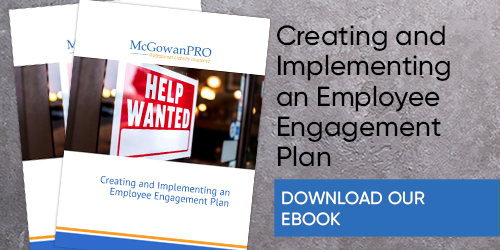Even before the Great Resignation began in 2021 and the Great Reshuffle in 2022, accounting firms had a problem with employee retention. According to the 2015 IPA National Benchmarking Report conducted by Platt Consulting Group, the largest accounting firms averaged a turnover rate of 17%, with one out of every six facing a turnover rate of over 20%. Two factors are compounding the issue: the surge of baby boomer retirements and a shortage of qualified candidates. Savvy hiring managers create an employee retention plan to address the issues surrounding hiring, firing, employee exits, and company culture.
A good retention plan begins with the recruitment phase of hiring. This post will look at how to “recruit for retention” by attracting qualified candidates, screening out poor and unqualified candidates in the interview process, and prioritizing employee engagement.
Communicating and living up to company values
When creating an employee retention plan, one of the first steps should be to review the company’s values. Are they clearly defined? Where can potential recruits see the company’s values? And most importantly, how are those values represented from day to day?
More than ever, prospective employees, especially younger people, prioritize companies whose values reflect their own. Things like integrity; equity, diversity, and inclusion; fairness; transparency; and a commitment to employee satisfaction are increasingly important. If employees find outlined company values to be a mere empty promise, it’s likely they will return to the job market. For example, it is one thing for a firm to say that it values “transparency” and quite another to embody it.
A straightforward way to ensure that your company is living up to its values is to look at reviews on sites like Glassdoor, where employees leave honest reviews of their employers. Of course, there is the occasional unfounded bad review, but those can be easily disqualified. If you notice common themes about an unsatisfactory company culture, leadership should consider evaluating how to best live up to your defined company values.
Also read: What Accounting Professionals Should Know about Retirement and Succession Planning
Create interview questions that qualify and inspire prospective hires
Hiring managers often treat interviews as a one-way street, with traffic flowing from the employer to the potential hire. But firms are auditioning for the employee as well. In that spirit, interviewers should have two goals: prove that the candidate is qualified. and give the candidate a real experience of what it will be like to work at the firm.
Here are a few tips for interviewers:
- Ask questions that communicate the firm’s values. For example, if a company’s value is “honesty,” the interviewer can ask questions about the interviewee’s relationship with honesty in their work. For example, “When was a time when a coworker or manager lied to you? How did you react?”
- Communicate opportunities for growth. Your ideal candidates want to invest their time and skillset with companies that want them to develop, learn, and grow as professionals and individuals. It’s important to advertise the types of professional development you provide and encourage for your employees.
- Emphasize company culture. Paint a compelling picture because culture is a top factor for many job seekers. Additionally, as an employer, hiring people who value company culture benefits retention in the long run. To maintain a thriving, positive working environment, people at every level must be commited to it.
Learn more: How can the Employee Retention Credit benefit your organization?
Prioritize employee engagement in employee retention plans
According to the CPA Journal, a driving factor of employee retention is engagement. Employee engagement is defined by an individual’s sense of purpose and how energized they are in pursuing an organization’s goals.
Once a candidate becomes a hire, engagement is a crucial part of their onboarding. Engaged employees are more productive, perform better, and are much less likely to leave the firm. Research has shown that the top three drivers of engagement are:
- Value alignment
- Job fit
- Making a difference
When employee values align with their employers, they can use their talents to perform their job duties, and they make an impact. Additionally, they are much more likely to become more than employees but loyal stakeholders for many years to come.
Make it easy for exiting employees to return
Finding qualified new employees who are a great fit for your company is an expensive endeavor. Companies invest many hours and dollars in the training and professional development of their employees. For that reason, accounting firms should make it easy for departing employees to return in the future.
Firms should avoid “burning bridges” and instead make employees who leave feel valued for their contributions. This may involve reviewing how a firm conducts exit interviews. Treating departing employees well also has the benefit of boosting the firm’s reputation and increasing the chances of attracting other talented recruits.
Protect yourself with employee liability coverage
Accounting firms can boost retention rates by crafting an employee retention plan that prioritizes intentional recruitment. We’ve established that firms can find value-aligned prospects by effectively communicating and living up to their values. Curated interviews screen candidates for the best candidates and give potential employees a real feel for the company. Additionally, new hires who find themselves engaged during onboarding are more likely to become stakeholders in the firm.
However, plans aren’t foolproof for long term employee retention. Despite your best efforts to maintain employee satisfaction, sometimes departures are related to workplace conflict. Further, employers occasionally must make the difficult decision to terminate an employee. Even the best-intended firms may find themselves defending against a wrongful termination or workplace-related lawsuit.
McGowan’s Employment Practices and Liabilities Insurance (EPLI) defends businesses against legal damages from workplace-related lawsuits. A single EPLI claim could bankrupt a small firm. All too often, Business Owners’ Policies are too limited to provide real-world coverage.
Get in touch with a liability expert today and ensure that your firm is fully covered.


